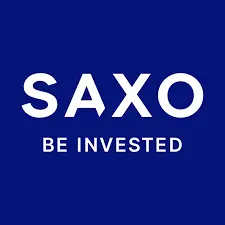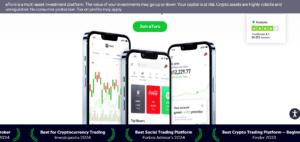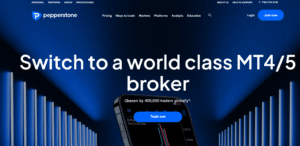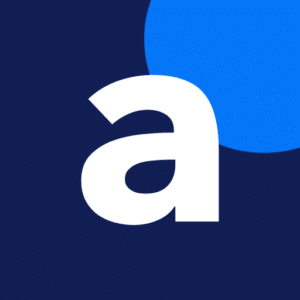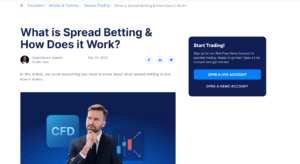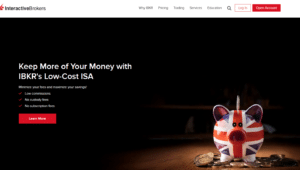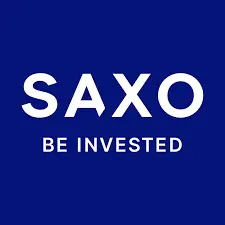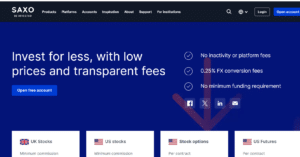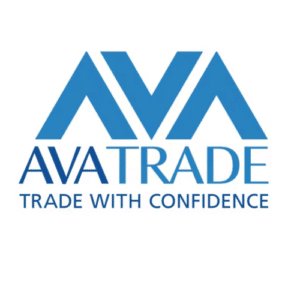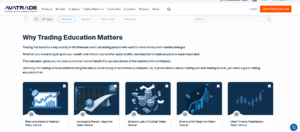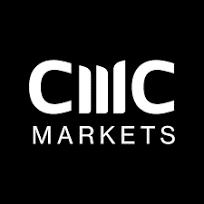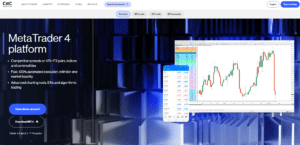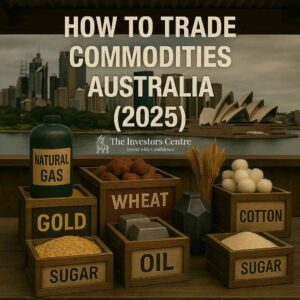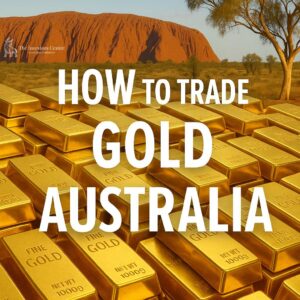7 Best Forex Brokers in Australia for 2025
Adam Woodhead
Co-Founder
Adam is a passionate investor who created The Investors Centre (TIC) to combine his professional skills with his love for investment. His goal is to offer a platform filled with valuable resources, practical advice, and effective strategies for anyone looking to make their mark in the investment world.
“Investment is about more than just numbers; it’s about strategy, research, and the willingness to adapt. At TIC, we’re here to provide the tools and knowledge you need to succeed on your investment journey.”
Thomas Drury
Co-Founder
Thomas is an experienced financial trader in leverage instruments, crypto and general investing. He has over a decade experience in finance and holds Chartered Status in the financial industry, Thomas’s speciality is trading CFDs, Forex and Day Trading. His crypto portfolio is heavily weighted towards BTC and Eth, but enjoys trading low cap crypto’s with higher volatility. Thomas’s favourite trading strategy is break out Trading.
“Our commitment at The Investors Centre is unwavering. We strive to provide clear, actionable advice that empowers you to achieve financial success. Our vision is a future where anyone can invest confidently and wisely.”
Investment Education at The Investors Centre
We provide clear, research-based insights to help readers understand investment strategies and market trends.
How We Work
- Research: We gather data from reliable financial sources.
- Analysis: Our team evaluates trends and scenarios using analytical tools.
- Content Creation: Insights are translated into simple, educational content.
- Updates: Information is regularly reviewed for accuracy and relevance.
Disclaimer
Content is for educational purposes only and not financial advice. Please consult a professional before making investment decisions.
Terms
We do not guarantee the accuracy or completeness of our content. See our terms of service for details.
Content on this website is for educational purposes only and not professional financial advice. Always consult a qualified advisor before making financial decisions.
Liability
We do our best to keep information accurate and up to date, but we make no guarantees. Use of this site and reliance on its content is at your own risk. We are not liable for any losses or damages resulting from its use.
No Professional Advice
We do not provide investment, legal, or tax advice. Nothing on this site should be considered as such.
Third-Party Links
External links are provided for convenience. We are not responsible for the content or reliability of third-party sites and do not necessarily endorse them.
Terms of Use
By using this website, you agree to this disclaimer and our terms. Content is protected by intellectual property laws and may not be used without permission.
Updates
This disclaimer may change. Continued use of the site indicates acceptance of any updates.
Contact
Questions? Email us at info@theinvestorscentre.com
Table of Contents
Disclaimer
How We Test
Discover our carefully selected list of top-rated forex brokers, each thoroughly reviewed and tested. Every broker is ASIC-regulated and fully accessible to Australian traders.

eToro
AUS Day Trading Score: 4.65/5
51% of retail CFD accounts lose money.
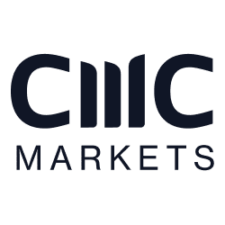
CMC Markets
AUS Day Trading Score: 4.6/5
70% of retail CFD accounts lose money.

Pepperstone
AUS Day Trading Score: 4.5/5
81.7% of retail CFD accounts lose money.

Admirals
AUS Day Trading Score: 4.5/5
61% of retail CFD accounts lose money.
Quick Answer: What are the Best Forex Brokers in Australia?
eToro stands out as the best forex broker in Australia for 2025. It offers an intuitive platform, innovative social trading tools, and strong regulatory oversight through ASIC, making it ideal for both beginners and experienced traders.
Featured App - eToro
A global leader in social investing, eToro empowers millions of users to trade and invest in a wide range of assets with ease. Known for its user-friendly platform, innovative copy trading features, and strong regulatory framework, eToro continues to redefine how individuals access financial markets.
- Minimum Deposit: £0 (via bank transfer in the UK)
-
- Market Spread:
- From 0.1% (UK Stock CFDs)
- From 1.0 pip (Major Forex pairs)
- Market Spread:
-
FCA Regulated (FRN 583263)
-
TradingView Integration Available
-
Innovative CopyTrader™ System
- Access to 25 major stock indices, 900+ share CFDs, 62 forex pairs, 17 commodities, and 100+ ETFs — all in CFD form
CFDs are complex instruments with a high risk of losing money rapidly due to leverage. 51% of retail CFD accounts lose money when trading CFD’s with this provider. You should consider whether you understand how CFDs work and whether you can afford to take the high risk of losing your money.
Comparison of Forex Brokers in Australia
| Rank | Broker | Regulation | Spreads from | Commission per Lot | Forex Pairs Available |
|---|---|---|---|---|---|
| #1 | eToro | ASIC | 1.0 pips | None | 50+. |
| #2 | Pepperstone | ASIC, FCA, CySEC | 0.0 pips (Razor) | $3.50 | 60+. |
| #3 | Admirals | ASIC, FCA | 0.5 pips | $3.00 | 40+. |
| #4 | Interactive Brokers | ASIC, CFTC, FCA | Variable | $2.00 | 100+ |
| #5 | Saxo | ASIC, FCA | 0.6 pips | $3.50 | 180+. |
| #6 | AvaTrade | ASIC, IIROC | 1.3 pips | None | 55+. |
| #7 | CMC Markets | ASIC | 0.7 pips | None | 330+. |
Top Ranked Forex Brokers in Australia for 2025
- eToro – Social trading with top-tier tools.
- Pepperstone – Low spreads and fast execution.
- Admirals – Advanced tools for serious traders.
- Interactive Brokers – Best for professional portfolios.
- Saxo – Premium services for high-net-worth traders.
- AvaTrade – Ideal for beginners with great education.
- CMC Markets – Comprehensive analysis and research tools.
Getting started with forex trading can be daunting. From hidden fees to user-unfriendly platforms, I’ve learned many lessons the hard way. This guide brings together my personal experiences and in-depth research to rank the top forex brokers in Australia for 2025. Whether you’re new to trading or a seasoned pro, these brokers offer a combination of safety, features, and value.
Why Is It Ranked #1?
eToro is the leader in social trading, making it perfect for beginners who want to learn from experienced traders. I started using eToro’s CopyTrader feature, and it allowed me to replicate the strategies of top traders, accelerating my learning curve. Its intuitive platform and multi-asset offering further strengthen its appeal.
What are the Pros & Cons?
- Social trading
- Beginner-friendly interface
- Multi-asset platform.
- Higher spreads compared to some competitors.
-
What are the Fees and Spreads?
-
What Trading Tools Are Available?
-
How Safe Is the Platform?
eToro charges no commissions on trades, but its spreads average 1.0 pips for EUR/USD. A $5 withdrawal fee applies, and accounts incur a $10 inactivity fee after 12 months of non-use.
eToro’s proprietary platform is sleek and web-based, with a mobile app for trading on the go. Its standout CopyTrader feature makes it unique, especially for new traders seeking guidance.
As an ASIC-regulated broker, eToro ensures the safety of client funds by storing them in segregated accounts. It also uses robust encryption to protect user data, making it a trusted choice for Australian traders.
CFDs are complex instruments with a high risk of losing money rapidly due to leverage. 51% of retail CFD accounts lose money when trading CFD’s with this provider. You should consider whether you understand how CFDs work and whether you can afford to take the high risk of losing your money.
Why Is It Ranked #2?
Pepperstone is renowned for its low spreads and fast execution, making it ideal for scalpers and day traders. I’ve used their Razor account during volatile sessions and consistently benefited from their tight spreads and speed.
Pros & Cons
- Ultra-low spreads
- Fast trade execution.
- MetaTrader support.
- Limited educational resources for beginners.
-
What are the Fees and Spreads?
-
What Trading Tools Are Available?
-
How Safe Is the Platform?
epperstone offers spreads starting from 0.0 pips on its Razor account, with a $3.50 commission per lot. The Standard account is commission-free but has wider spreads.
Pepperstone supports MetaTrader 4/5, cTrader, and TradingView. These platforms offer flexibility and robust tools for traders who prefer advanced setups.
Fully ASIC-regulated, Pepperstone segregates client funds in Tier 1 banks, ensuring security and compliance with Australian laws.
CFDs are complex instruments with a high risk of losing money rapidly due to leverage. 81.7% of retail CFD accounts lose money when trading CFD’s with this provider. You should consider whether you understand how CFDs work and whether you can afford to take the high risk of losing your money.
Why Is It Ranked #3?
Admirals shines for its advanced tools and analytics. Its MetaTrader Supreme Edition helped me refine my trading strategies by offering in-depth market sentiment tools and customisable charts.
Pros & Cons
- Supreme Edition analytics
- MetaTrader compatibility
- Educational resources.
- Less suitable for beginners due to complexity.
-
What are the Fees and Spreads?
-
What Trading Tools Are Available?
-
How Safe Is the Platform?
Admirals offers spreads from 0.5 pips on its Zero.MT4 account, with a $3.00 commission per lot. Pricing is transparent, catering well to experienced traders.
Admirals enhances MetaTrader 4/5 with the Supreme Edition, providing tools like risk management calculators, advanced charts, and trade simulators.
As an ASIC-regulated broker, Admirals prioritises client safety by holding funds in segregated accounts and undergoing regular audits.
CFDs are complex instruments with a high risk of losing money rapidly due to leverage. 61% of retail CFD accounts lose money when trading CFD’s with this provider. You should consider whether you understand how CFDs work and whether you can afford to take the high risk of losing your money.
Why Is It Ranked #4?
Interactive Brokers is a go-to choice for high-volume professional traders due to its extensive range of tradable assets and low fees. I initially found its platform complex, but as I explored its tools, I realised how well it caters to experienced traders.
Pros & Cons
- Low trading fees
- Access to global markets
- Advanced order types.
- Complex interface
- High minimum deposit.
-
What are the Fees and Spreads?
-
What Trading Tools Are Available?
-
How Safe Is the Platform?
Interactive Brokers offers spreads that vary depending on the market but are competitive for high-volume traders. Its commissions start at \$2.00 per lot, and the platform requires a $10,000 minimum deposit.
The Trader Workstation (TWS) is a professional-grade platform featuring advanced tools, including portfolio management, order customisation, and API trading. Mobile and web versions are also available.
Regulated globally, including ASIC compliance, Interactive Brokers follows strict security protocols and segregates client funds to ensure protection.
CFDs are complex instruments with a high risk of losing money rapidly due to leverage. 62.5% of retail CFD accounts lose money when trading CFD’s with this provider. You should consider whether you understand how CFDs work and whether you can afford to take the high risk of losing your money.
Why Is It Ranked #5?
Saxo caters to high-net-worth traders with its premium services and extensive asset selection. I’ve relied on their expert research tools to navigate niche investments and found the platform invaluable for advanced strategies.
Pros & Cons
- Extensive market access
- Professional-grade tools
- Premium support.
- High fees and deposit requirements.
-
What are the Fees and Spreads?
-
What Trading Tools Are Available?
-
How Safe Is the Platform?
Spreads start at 0.6 pips, with commissions varying based on account type. The $10,000 minimum deposit makes it less accessible for casual traders.
SaxoTraderGO and SaxoTraderPRO offer customisable tools, deep market access, and institutional-level insights. These platforms are best suited for managing complex portfolios.
As an ASIC-regulated broker, Saxo upholds strict safety measures, including segregated accounts and compliance with Australian financial laws.
CFDs are complex instruments with a high risk of losing money rapidly due to leverage. 64% of retail CFD accounts lose money when trading CFD’s with this provider. You should consider whether you understand how CFDs work and whether you can afford to take the high risk of losing your money.
Why Is It Ranked #6?
AvaTrade is perfect for beginners, offering a simplified platform and comprehensive educational resources. When I first started trading, their tutorials and demo accounts helped me gain confidence.
Pros & Cons
- Beginner-friendly
- Risk management tools
- Fixed spreads.
- Limited advanced tools for experienced traders.
-
What are the Fees and Spreads?
-
What Trading Tools Are Available?
-
How Safe Is the Platform?
AvaTrade uses a fixed spread model, starting at 1.3 pips, with no commission fees. This simplicity is ideal for new traders.
The platform supports MetaTrader 4/5, a proprietary AvaTradeGO app, and features such as AvaProtect, which helps minimise risk on trades.
Fully ASIC-regulated, AvaTrade ensures client funds are secure and provides 24/5 multilingual support, which is beneficial for Australian users.
CFDs are complex instruments with a high risk of losing money rapidly due to leverage. 62.5% of retail CFD accounts lose money when trading CFD’s with this provider. You should consider whether you understand how CFDs work and whether you can afford to take the high risk of losing your money.
Why Is It Ranked #7?
CMC Markets excels in comprehensive forex pair offerings and in-depth research tools. I’ve used their platform to track trends and inform long-term strategies.
Pros & Cons
- An extensive range of forex pairs.
- Advanced charting tools.
- ASIC-regulated.
- Overwhelming for beginners due to its complex interface.
-
What are the Fees and Spreads?
-
What Trading Tools Are Available?
-
How Safe Is the Platform?
CMC Markets offers spreads from 0.7 pips, with no commission on forex trades. However, inactive accounts may incur fees.
Their proprietary platform features advanced charting, economic indicators, and robust research tools. It’s an excellent choice for traders focused on analytics.
As an ASIC-regulated broker, CMC Markets ensures client funds are held securely in segregated accounts, adhering to Australian financial regulations.
CFDs are complex instruments with a high risk of losing money rapidly due to leverage. 70% of retail CFD accounts lose money when trading CFD’s with this provider. You should consider whether you understand how CFDs work and whether you can afford to take the high risk of losing your money.
Why Trust Our List of the the top ranked Forex Brokers in Australia?
Our rankings are based on a thorough evaluation of brokers, considering:
- Regulation and Safety: Prioritising ASIC-regulated brokers.
- Fees and Spreads: Comparing costs to ensure competitive pricing.
- Platform Features: Analysing usability, advanced tools, and mobile accessibility.
- Customer Support: Verifying quality and availability of assistance.
Why ASIC Regulation Matters
ASIC (Australian Securities and Investments Commission) ensures brokers operate with integrity, protecting traders’ funds and enforcing compliance with strict financial regulations. ASIC-regulated brokers are required to:
- Hold client funds in segregated accounts, safeguarding your deposits.
- Undergo regular audits to maintain transparency and fairness.
- Provide dispute resolution mechanisms, ensuring traders are treated fairly.
How to Choose the Best Forex Broker For you
Key Factors to Consider
Keeping trading costs low is essential for long-term profitability, especially when you’re actively trading currency pairs. I always look for brokers that offer zero pip spreads or ultra-tight bid/ask spreads, as even a small difference can impact your bottom line over time. Top brokers like Pepperstone and Admirals consistently deliver competitive spreads, sometimes starting from 0.0 pips, particularly on major pairs.
2. Passive Fees and Costs:
Many platforms also charge commissions per trade, which can add up quickly. Beyond trading, it’s important to factor in non-trading fees like withdrawal fees, inactivity fees, and even financing rates for positions held overnight. Don’t forget to review a broker’s margin requirements too, as these affect how much capital you need to open and maintain positions. For a true picture of your transaction costs, always review the broker’s full fee schedule, not just the headline spreads.
3. Trading Tools and Features:
Advanced tools such as MetaTrader 4/5, cTrader, or proprietary tools like eToro’s CopyTrader can greatly enhance your trading. Choose brokers that align with your trading style and technical requirements.
4. ASIC Regulation:
ASIC regulation is essential for trader safety in Australia. It ensures brokers follow strict standards, segregating funds and maintaining transparency. Always verify a broker’s ASIC compliance.
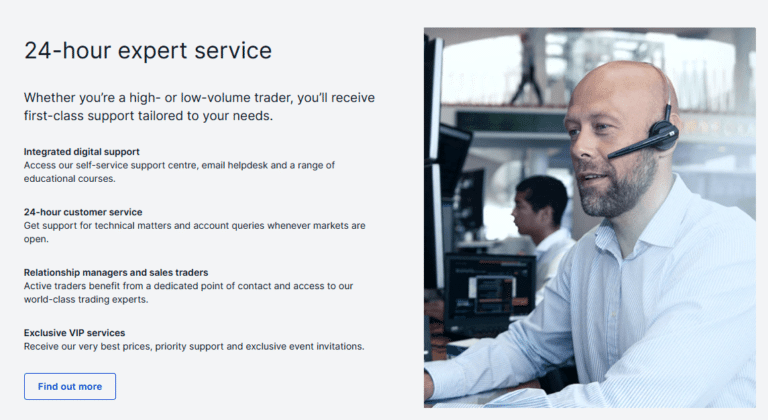
5. Customer Support:
Look for brokers that provide 24/7 support, preferably with local Australian assistance. A responsive team can be invaluable, especially during live trading.
6. Trading Platforms:
User-friendly platforms with mobile accessibility are essential. Brokers like AvaTrade and eToro excel in offering seamless interfaces for beginners. Advanced traders may prefer customisable tools provided by Pepperstone or Saxo.
Forex Trading for Beginners: Key Starting Points
- Start with a demo account: Practise trading currency pairs using virtual funds with no financial risk.
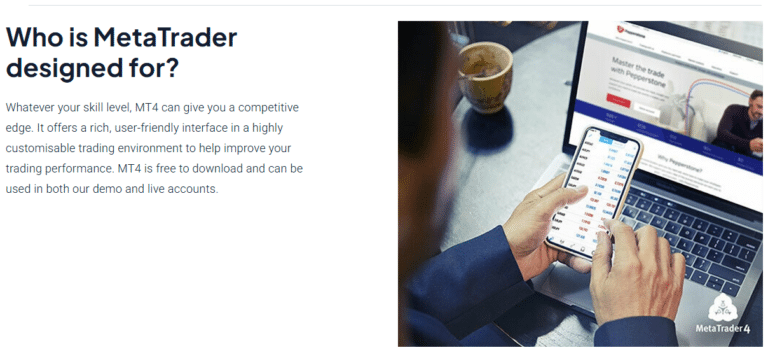
- Choose your platform: I began with MetaTrader 4 (MT4) and later used MT5—both are widely supported and beginner-friendly. Some brokers also offer proprietary platforms with unique tools.
- Look for commission-free trading: Many Australian brokers offer commission-free forex CFDs, but make sure to understand how spreads impact your actual trading costs.
- Use a micro forex trading account: This allows you to trade smaller positions and manage risk more effectively as a beginner.
- Take advantage of educational resources: Use broker-provided educational tools, join trading seminars, and dive into both technical analysis and fundamental analysis to build your trading knowledge.
- Prioritise risk management: Create and stick to a strong risk management strategy—protecting your capital is just as important as making profits.
What Common Mistakes Should I Avoid When Selecting a Forex Broker?
- Ignoring Regulation: Many traders are lured by unregulated brokers offering unrealistic bonuses, only to face issues withdrawing their funds.
- Overlooking Fees: Always review full fee structures, including spreads, commissions, and overnight charges, to avoid surprises.
- Choosing Based on Promises: Be wary of brokers guaranteeing profits—no trading platform can ensure success.
Identifying Red Flags
- Unclear Fee Structures: Avoid brokers that don’t clearly disclose costs like spreads or withdrawal fees.
- No Licensing Information: Brokers without ASIC regulation or registration should be avoided.
- Poor Reviews: Consistent complaints about fund withdrawals or customer service are major warning signs.
How to Spot Forex Scams
- Check Regulation: Ensure the broker is listed as ASIC-regulated.
- Beware of Unrealistic Returns: Any broker promising guaranteed high profits is likely a scam.
- Verify Contact Information: Legitimate brokers provide detailed and verifiable contact details.
What are the Basics of Forex trading?
Forex trading involves speculating on the price movements between two currencies—like AUD/USD—often through instruments like CFDs (Contracts for Difference), which allow for trading with leverage. That means you can control a larger position with a smaller deposit, though it also ramps up the risk.
Fortunately, forex trading is legal and well-regulated here, with the Australian Securities and Investments Commission (ASIC) keeping a close eye on brokers and market practices.
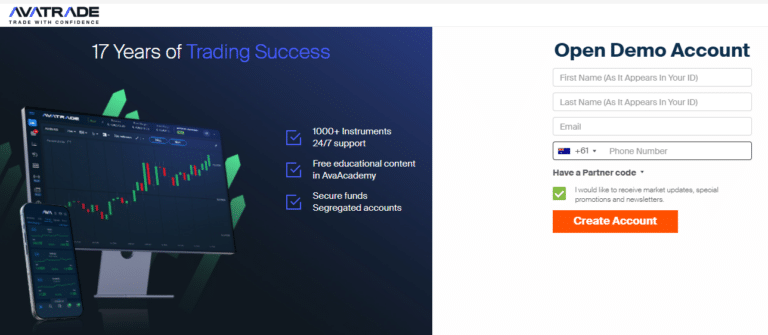
Before I risked any real money, I started with a demo account to practice different trading strategies, like day trading and breakout trading, while getting a feel for micro lot contracts.
I spent a lot of time learning both technical analysis and fundamental analysis, which are essential tools for understanding market trends. For anyone just starting out, my advice is to build a solid trading plan, focus on risk management, and never stop learning—because that’s how you grow from a beginner into a confident trader.
What are some common Forex Trading strategies?
Over the years, I’ve experimented with a range of forex trading strategies, and I’ve found that having a solid trading plan tailored to your personal goals and trading style can make a world of difference. Whether you prefer day trading, swing trading, scalping, or breakout trading, the key is consistency and discipline.
| Aspect | Details & Tips |
|---|---|
| Trading Plan | Tailor your plan to fit your personal goals and trading style. Consistency is key. |
| Popular Strategies | Day trading, swing trading, scalping, and breakout trading. |
| Analysis Tools | Use technical analysis via platforms like MetaTrader; watch fundamental news events. |
| Instruments | Trade CFDs for leveraged exposure and flexibility. |
| Risk Management | Use position sizing and define risk/reward before entering a trade. |
| Discipline | Stick to your strategy; success depends on a balanced, disciplined approach. |
I always use position sizing techniques to control exposure, and I never enter a trade without a clear plan for both risk and reward. No matter your level of experience, blending strategy with discipline is how you turn potential into performance.
What legal and tax aspects do I need to Consider?
Staying on top of the legal and tax landscape is just as important as managing market risk. In Australia, forex trading is completely legal and regulated under the Corporations Act of 2001. This means that online forex brokers must hold an Australian Financial Services Licence (AFSL) issued by the Australian Securities and Investments Commission (ASIC).
From a tax perspective, the Australian Taxation Office (ATO) considers profits from forex trading to be assessable income, especially if you’re treating it as an income-generating activity rather than a hobby.
I make sure to include all foreign exchange trading profits in my tax return filings, and keep detailed records so I can claim any allowable deductions—like software subscriptions or internet costs.
If you’re classified as a sophisticated investor, some rules may differ slightly, so it’s worth consulting a tax professional to make sure you’re covered from a compliance standpoint. Trust me—it’s a lot easier to trade with confidence when you’ve ticked all the legal and tax boxes.
Key Takeaways
Choosing the right forex broker is crucial—I’ve learned that the hard way.
Focus on ASIC-regulated platforms with strong reputations, tight spreads, and reliable tools like MetaTrader. The brokers I’ve listed combine features, support, and compliance you can trust.
Trading isn’t just about profits—it’s about having a plan, managing risk, and always learning. Pick a broker that fits your style, stay informed, and keep sharpening your edge.
FAQs
Is forex trading legal in Australia?
Yes, forex trading is legal and regulated in Australia. Brokers must hold an Australian Financial Services Licence (AFSL) and be overseen by the Australian Securities and Investments Commission (ASIC) to operate legally.
Do I have to pay tax on forex trading profits in Australia?
Yes. The Australian Taxation Office (ATO) considers forex trading profits as assessable income, especially if trading is done as an income-generating activity. Traders are required to report this income in their tax return filings and maintain proper record keeping.
What leverage is allowed for forex trading in Australia?
Under ASIC regulations, the maximum leverage for retail traders is capped at 30:1 for major currency pairs to help reduce risk. Professional or sophisticated investors may qualify for higher leverage if they meet specific criteria.
What are some common forex trading strategies?
Popular strategies include day trading, swing trading, scalping, and breakout trading. These can be combined with technical analysis, fundamental analysis, and a solid risk management strategy to improve consistency.
What should I look for in an Australian forex broker?
Look for ASIC regulation, tight spreads, low transaction costs, fast execution speeds, good trust scores, and reliable mobile trading apps. Also, check if the broker offers zero-commission options and segregates client funds.
Can I practise forex trading without risking real money?
Yes, most Australian brokers offer a demo account, which lets you test strategies and use the platform without risking actual funds. It’s an excellent way to build confidence before going live.
References
- Statista. “Daily turnover of the Australian dollar on the foreign exchange market in Australia from 2001 to 2019 (in billion U.S. dollars).
- BBC News. “Banks face new legal action over forex manipulation.
- The Australian. “Forex trader’s conduct unconscionable, court finds.
- Australian Securities and Investments Commission (ASIC) – Regulatory information on forex and CFD trading
- Australian Taxation Office (ATO) – Foreign exchange gains and losses
- Corporations Act 2001 – The primary legislation governing financial services and markets in Australia.
- Reserve Bank of Australia (RBA) – Exchange Rates and Market Analysis





